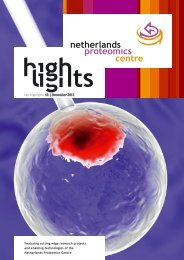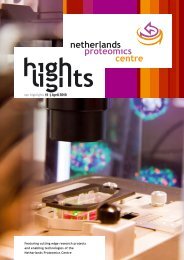NPC Progress Meeting 2012 - Netherlands Proteomics Centre
NPC Progress Meeting 2012 - Netherlands Proteomics Centre
NPC Progress Meeting 2012 - Netherlands Proteomics Centre
- No tags were found...
You also want an ePaper? Increase the reach of your titles
YUMPU automatically turns print PDFs into web optimized ePapers that Google loves.
“The ultimate goal is to develop a moleculethat may lead to a medical application.”Careerconsists of the scientists who come up with interesting biologicalquestions. The third group generates reagents and tools thatallow tackling the questions posed by group 2 using the expertiseof group 1. I am part of the third group and my role is to providethis link. We really put chemical biology into practice.”In businessThe way he talks about his research creates the impressionthat his primary goal is to serve the work of other scientists.Is he really that modest and service-oriented? He laughs a bit.“Well, yes, but that’s true for many researchers. You want tocontribute to the field. My aim is to establish a broad toolboxof chemical reagents to study the ubiquitin-proteasomesystem.” When it comes to serving the broader field, Ovaaliterally means business.In 2010 he and postdoc Farid El Oualid co-founded UbiQ, whichcommercialises the ubiquitin-related agents developed byhis lab. “The quickest way to make your results known andhave them used is to put them in a catalogue. It’s a familiarsystem and works for everyone.” But there is more. “Wecould come across an interesting drug lead; I certainly don’trule that out.” So there is another objective besides servingthe scientific community? Again a smile, but now more tingedwith incredulity. “Of course there is! The ultimate goal is todevelop a molecule that may lead to a medical application.A new drug: that is what everyone in this field wants.” Hestrongly favours scientists taking an active role in valorisationof their findings. “When you discover something promising, itis your duty to take it further. You don’t just put it on somebody’sdesk and hope for the best.”New drug leadsIn Ovaa’s case, the new drugs he is after are likely to be smallmolecules that act as chemical inhibitors of ubiquitin-mediatedpathways. “We very specifically study how the proteinubiquitinationcascade is organised. Our key question is howubiquitination regulates proteasome activity. Studying this indetail, which means covering both the chemistry and the biochemistry,could very well result in the discovery of new leadsfor drug targets or molecules with therapeutic potential.”His <strong>NPC</strong> project ‘Tyrosine phosphatase inhibitors, baits andABPs’ supports this claim, as the team succeeded in identifyinga number of very promising tyrosine phosphatase inhibitors.More generally he feels that this project also demonstratesthe need for adequate chemical reagents and targetedquestions in order to really deploy the power of proteomics.“I do not believe in systems biology in the sense that generatingbig datasets will somehow reveal the answers straight froma computer. You need focus. In the end, we aim for a betterunderstanding of biological processes and that forces you tofocus on a well-defined question.”Huib Ovaa2010 Co-founder and C.S.O. of UbiQ2009 Tenured staff member <strong>Netherlands</strong> CancerInstitute2004 Group leader <strong>Netherlands</strong> Cancer Institute2003 Instructor in Pathology at Harvard MedicalSchool2001 Postdoc at Harvard Medical School2001 PhD degree (cum laude) at LeidenUniversityAwards2011 KNCV Gold Medal (Royal <strong>Netherlands</strong>Chemical Society)2011 ERC Starting Grant2010 Amsterdam Inventor Award2010 <strong>NPC</strong> Valorisation Voucher2009 NVBMB prize2005 NWO VIDI Fellowship2003 NWO VENI FellowshipRecent key publications• Geurink P.P., et al. (<strong>2012</strong>) A general chemicalligation approach towards isopeptide-linkedubiquitin and ubiquitin-like assay reagents.ChemBioChem 13:293-297• El Oualid F., et al. (2010) Chemical synthesis ofubiquitin, ubiquitin-based probes and diubiquitin.Angew.Chem. Int. Ed. 49:10149-10153• Albers H.M.H.G., et al. (2010) Boronic acidbasedinhibitor of autotaxin reveals rapidturnover of LPA in the circulation. PNAS (107)16:7257-7262Quality is the bottleneckThe future of proteomics is not necessarily about furthertechnological advancement of the equipment says Ovaa. “Thecurrent MS machines are so sensitive I really don’t see howfurther improvement on that part alone would contribute toscientific progress. The main bottleneck right now is the qualityof the samples. New chemical reagents and new methodsand tools for quantitative analysis are what we need for futurebreakthroughs.”And the future of the <strong>Netherlands</strong> <strong>Proteomics</strong> <strong>Centre</strong>? “Theconcept of the <strong>NPC</strong> is very valuable and I would really like tosee it continued. To me the added value of the <strong>NPC</strong> is in havingaccess to the right know-how and facilities and particularlyall the other researchers involved with <strong>NPC</strong>. It is great to bepart of a community of people who share your interests. In theend, it is all about interesting questions and interactions.”|






